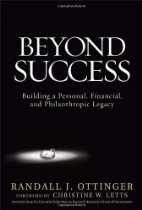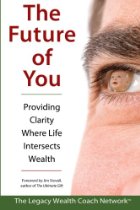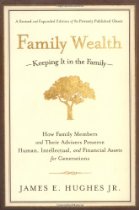Legacy Belief Three – True Wealth Is Greater Than Financial Capital

“It requires a great deal of boldness and a great deal of caution to make a great fortune; and when you have got it, it requires ten times as much wit to keep it.”
Meyer A. Rothschild
Through my research, and working with high net worth families, I have discovered that people usually have six core capacities:
1) Human Capacity – Simply Being Yourself.
2) Financial Capacity – Simply what you possess.
This includes the assets found in your net worth statement (your financial capital) and your ability to generate cash flow (your revenue capital).
3) Lifestyle Capacity – Simply your lifestyle choices.
This includes all the material goods in your life – expensive toys and things that typically have minimal value on your net worth statement but which have cost you time and money (your lifestyle capital), how you are choosing to live your life (your life-choices capital), and the experiences you are creating in your life (your experiential capital). Your bucket list would fall into this category.
4) Social Capacity – Simply your relationships with others.
This includes immediate family (your family capital), extended family (your family network capital), your friends (your friendship capital), your business colleagues and professional network (your business and professional network capital), the community that you live in (your community capital), etc. Philanthropy, charitable giving, and helping others falls under this capacity as well (your social capital)
5) Spiritual Capacity – Simply what is the greater good/cause in your life.
This is where a person decides if a) they are a human being trying to have a spiritual experience or b) whether they are a spiritual being having a human experience. All religious beliefs, new age beliefs, or spiritual beliefs fall under this capacity (your spiritual capital).
6) Business Capacity – Simply the value of your unique abilities as determined by the marketplace.
Unfortunately, too many people question their self worth because the marketplace values a particular role within the community lower than others. In reality, you would be much better heeding the words of Marley’s ghost to Scrooge in the Charles Dickens’ A Christmas Carol movie:
“Business! Mankind was my business. The common welfare was my business; charity, mercy, forbearance, and benevolence, were all my business. The dealings of my trade were but a drop of water in the comprehensive ocean of my business!”
The real secret to True Wealth is the differentiation that you make between capacity and capital. Capacity is what you are capable of getting in your life where capital is what you currently have in your life. Too many people limit their thinking to capital, which in turn limits their True Wealth. You may have heard the saying that if you take all the wealth in the world and divided this wealth equally among all humans, in a very short period of time, the majority of this wealth would find it’s way back to the original wealthy people. The secret behind this phenomenon is the True Wealth mindset focused on capacity rather than scarcity of existing capital.
The following are your tasks for optimizing your True Wealth:
- Ask yourself, and answer, the following key questions about your human capacity:
- The real secret to Financial Wealth is to use your money and assets wisely to empower your core values and passions while making a difference in the lives of others in your purpose driven life.Too often I see people who accumulate assets for the sole purpose of success, fame, and power. The challenge with this financial driven approach is that it ignores that your life has a greater purpose. My simple recommendation in regard to Financial Wealth is for you to adopt a simple thought, “Love people, enjoy things.”
- Your core values are your moral compass in life so you need to spend adequate time to choose them wisely. I recommend that you spend the next month identifying your core values and making sure that your core values reflect the following:
- Govern your personal relationships
- Guide your life, financial, and business processes
- Clarify who you are
- Articulate what you stand for
- Help explain why you do what you do
- Are a guide for you to teach others
- Justify your rewards
- Guide you in making decisions
- Underpin your purpose driven life
- Require no external justification since they come from within you
- Reflect what is truly important in your life.
Your past mental, emotional, and conative experiences:
a) What did you think when you were young about your ___________? (insert words that are relevant in your life, like mother, father, brother, sister, friend, toys, school, etc.)
b) What did you feel when you were young about your ___________?(insert words that are relevant in your life, like mother, father, brother, sister, friend, toys, school, etc.)
c) What did you do when you were young with your ___________? (insert words that are relevant in your life, like mother, father, brother, sister, friend, toys, school, etc.)
Your present mental, emotional, and conative experiences:
a) What are you currently thinking about your ___________? (insert words that are relevant in your life, like wife, husband, children, brother, sister, friend, car. home, vacation, work, etc.)
b) What are you currently feeling about your ___________? (insert words that are relevant in your life, like wife, husband, children, brother, sister, friend, car, home, vacation, work, etc.)
c) What are you currently doing with your ___________? (insert words that are relevant in your life, like wife, husband, children, mother, father, brother, sister, friend, car, home, vacation, work ,etc.)
Your future mental, emotional, and conative experiences:
a) What will you be thinking about your ___________? (insert words that are relevant in your life, like wife, husband, children, brother, sister, friend, car. home, vacation, work, grandchildren, nephews, nieces, etc.)
b) What will you be feeling about your ___________? (insert words that are relevant in your life, like wife, husband, children, brother, sister, friend, car. home, vacation, work, grandchildren, nephews, nieces, etc.)
c) What will you be doing with your ___________? (insert words that are relevant in your life, like wife, husband, children, brother, sister, friend, car. home, vacation, work, grandchildren, nephews, nieces, etc.)
To help you clarify what your core values truly are, I suggest that you ask yourself the following question, “What does (insert your value here) really mean to me?” Keep asking this question for each new value that emerges from this question until you can no longer think of a value with deeper connection to your passions and well being
For example, if you were to ask, “What does money really mean to me,” you may say it provides you with the lifestyle that you want. Then you would ask, “What does lifestyle really mean to me?” This may lead to the answer that you can spend quality time with your family. Therefore, you would ask, “What does spending quality time with my family really mean to me?” which may lead to the answer…..Keep doing this until you can no longer come up with a deeper meaning.
Use this question for all the important things in your life. Once you have a list of the most important values for you, then prioritize your top three values for each area of your five capacities.. Then select your top five values from that list. You may be surprised with what you truly value since your five core values may be clumped together in only a few of your capacities. If you do this exercise correctly, your core values should accurately reflect what is happening in your life. If you like what you discover, then make your five core values the cornerstone of your purpose driven life. If you do not like the results that you are presently getting in your life, then honestly ask yourself if you are living your core values or whether you should re-prioritize your core values to better reflect the life that you want

RECOMMENDED RESOURCES
Beyond Success is the first thorough guide that assists individuals with the achievement of a meaningful and lasting financial, philanthropic, and generational family legacy. As a financial and philanthropic expert, Randall Ottinger combines his personal experiences in both fields with extensive research that draws on insights from hundreds of legacy leaders such as Bill Gates Sr., Jeff Brotman of Costco, and Sandy Weill of Citigroup, as well as thought leaders and advisors in the philanthropy and family wealth professions.
Ottinger reveals best practices and strategies you can adopt to:
- Turn money into a meaningful and fulfilling legacy
- Make wealth a positive force in your family
- Avoid the common pitfalls of family wealth transfers
- Prepare children for money
- Achieve social impact through “portfolio” philanthropy practices
- Preserve wealth, values, and enterprises across future generations
Ottinger develops a legacy planning framework to help translate your goals into measurable action steps for achieving the highest levels of personal fulfillment and social impact. He also provides insights into the latest trends in philanthropy, and examines the likely impact on the civil sector of the $100 trillion of wealth that is transferring from today’s baby boomers to future generations.

The Future of You
By The Legacy Wealth Coach Network
 What is the single most important indicator of wealth? Hint: It isn’t your assets, your bottom line, your bank account, or your list of valuables. In fact, a true definition of wealth extends far, far beyond the numbers. Unfortunately, most advisors ask the wrong questions, leaving their clients’ wealth unprotected and their plans incomplete. The Future of You redefines wealth and challenges the traditional approach to planning so that your financial and legacy plans embody your unique values.
What is the single most important indicator of wealth? Hint: It isn’t your assets, your bottom line, your bank account, or your list of valuables. In fact, a true definition of wealth extends far, far beyond the numbers. Unfortunately, most advisors ask the wrong questions, leaving their clients’ wealth unprotected and their plans incomplete. The Future of You redefines wealth and challenges the traditional approach to planning so that your financial and legacy plans embody your unique values.
The landmark book that changed the way exceptional families think about their heritage, their wealth, and their legacy to future generations–now revised and expanded.
Every family, looking at the next generation, hopes to confer advantages that are more than just material and financial–to inculcate character and leadership, to inspire creativity and enterprise, to help all family members find and follow their individual callings, and to avoid the financial dependency and loss of initiative that can all too often be an unwanted consequence of financial success. Yet many families never succeed in realizing that vision, much less sustaining it for three, four, or five generations and beyond.
